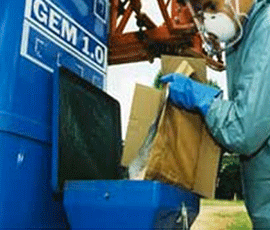CPA calls for crackdown on illegal pesticides trade

The UK Crop Protection Association has called for a crackdown on the trade in illegal pesticides from China.
Dominic Dyer, the CPA’s chief executive, said urgent action was needed to stamp out the growing global trade in illegal, untested and unregulated pesticide products, which were increasingly being targeted at the European market.
Speaking at a crop protection conference in Shanghai, Mr Dyer urged Chinese authorities to take action against companies who were making and trading in counterfeit pesticides.
“The Chinese Government and crop protection industry must take firmer action to stop the illegal spread of counterfeit pesticides,” said Mr Dyer.
“These products often contain substances which are banned in Europe, use inferior packaging which is liable to leak posing operator health and disposal problems, and can potentially damage crops and ruin farmers’ livelihoods.”
The Chinese Ministry of Agriculture responded by saying it was taking the problem of counterfeit pesticides very seriously.
The ministry said it feared that illegal pesticide manufacturing activities were undermining China’s reputation in the international pesticide market and as a major force in global agriculture and food production.
Any individual involved in the illegal trade of pesticides would receive “severe punishment, including prison sentences”, a spokesman added.
Mr Dyer welcomed the tough stance, but called for greater international co-operation to stamp out such activity.
“More countries must sign up to the Anti-Counterfeiting Trade Agreement (ACTA), which supports a strong international framework against illegal and counterfeit pesticide products,” he said.
“We also need to see more co-operation between police and customs authorities with a greater involvement of cross-border organisations, such as Interpol.
“At farm-gate level, we must ensure farmers only buy from reputable buyers.”
Clive Rainbird, Bayer CropScience’s PR and communications manager, said he fully supported Mr Dyer and was pleased that the Chinese government was taking the matter seriously.
Bayer regularly monitors product authenticity of pesticides and although “true” counterfeiting was extremely rare in the UK, the company was not complacent about it, he added.
“The UK market is generally much less at risk from counterfeiting than other parts of the world because of the close relationship between the manufacturers and distribution, and distribution and farmers,” Mr Rainbird explained.
“The vast majority of product in the UK is supplied direct to farm from a network of highly reputable distributors and this ensures that farmers can be assured that the product they receive is the ‘real deal’.”

